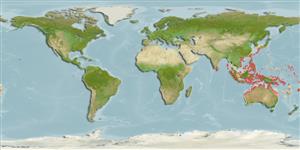Common names from other countries
Classification / Names
Noms communs | Synonymes | Catalog of Fishes(Genre, Espèce) | ITIS | CoL | WoRMS | Cloffa
>
Gobiiformes (Gobies) >
Gobiidae (Gobies) > Gobionellinae
Etymology: Gnatholepis: Greek, gnathos = jaw + Greek,lepis = scale (Ref. 45335).
More on author: Bleeker.
Environment: milieu / climate zone / depth range / distribution range
Écologie
marin récifal; profondeur 0 - 12 m (Ref. 92171). Subtropical
Western Pacific: relatively restricted from the Cocos-Keeling Islands, Philippines, Taiwan, southern Japan, Indonesia, New Guinea, Solomon Islands and Vanuatu.
Taille / Poids / Âge
Maturity: Lm ? range ? - ? cm
Max length : 5.5 cm SL mâle / non sexé; (Ref. 92171)
Description synthétique
Morphologie | Morphométrie
This moderate-sized (up to 55 mm SL) species has a distinctive colour pattern: in males, with 6 broad vertical dark blotchy bars along mid-side of body, several staggered rows of black spots along the dorsal part of the body, 1-4 irregular rows of golden yellow (in life) spots along lower half of body, 2 characteristic small black spots at base of first dorsal fin, and 1-3 staggered rows of oval black ocellate spots on anal fin (in life, red, blue and yellow may surround black spots); in females, with vertical dark body bars much paler and red and yellow markings much less distinct; D2 and anal fin rays nearly always I,11; pectoral rays 15-17 (usually 16); lateral scales 24-30 (usually 26); predorsal scales 9-10 (usually 8-9), ctenoid and cycloid (Ref. 92171).
Found in shallow waters, from reef tidepools, among seagrass, in shallow mangroves and (usually) sand and coral rubble reef substrates at depths of 0.2-12 m (Ref. 92171).
Life cycle and mating behavior
Maturité | Reproduction | Frai | Œufs | Fécondité | Larves
Larson, H.K. and D.J. Buckle, 2012. A revision of the goby genus Gnatholepis Bleeker (Teleostei, Gobiidae, Gobionellinae), with description of a new species. Zootaxa 3529:1-69. (Ref. 92171)
Statut dans la liste rouge de l'IUCN (Ref. 130435)
CITES (Ref. 128078)
Not Evaluated
Menace pour l'homme
Harmless
Utilisations par l'homme
Plus d'informations
Noms communsSynonymesMétabolismePrédateursÉcotoxicologieReproductionMaturitéFraiFéconditéŒufsDéveloppement de l'œuf
Taille/ÂgeCroissanceLongueur-poidsLongueur-longueurFréquences de longueursMorphométrieMorphologieLarvesDynamique des populations larvairesRecrutementAbondance
RéférencesAquacultureProfil d'aquacultureSouchesGénétiqueElectrophoresesHéritabilitéPathologiesTraitementMass conversion
CollaborateursImagesStamps, Coins Misc.SonsCiguateraVitesseType de nageSurface branchialeOtolithesCerveauxVision
Outils
Articles particuliers
Télécharger en XML
Sources Internet
Estimates based on models
Preferred temperature (Ref.
115969): 26.5 - 29.3, mean 28.7 (based on 1531 cells).
Phylogenetic diversity index (Ref.
82804): PD
50 = 0.5010 [Uniqueness, from 0.5 = low to 2.0 = high].
Bayesian length-weight: a=0.00977 (0.00442 - 0.02163), b=3.05 (2.86 - 3.24), in cm Total Length, based on LWR estimates for this (Sub)family-body shape (Ref.
93245).
Niveau trophique (Ref.
69278): 3.3 ±0.4 se; based on size and trophs of closest relatives
Résilience (Ref.
120179): Haut, temps minimum de doublement de population inférieur à 15 mois (Preliminary K or Fecundity.).
Fishing Vulnerability (Ref.
59153): Low vulnerability (10 of 100).
